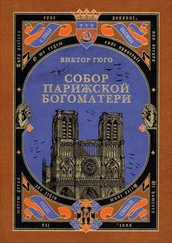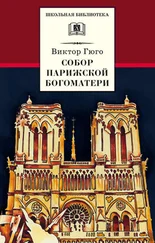| Victor Hugo |
Виктор Гюго |
| Notre-Dame de Paris The Hunchback of Notre Dame |
Собор парижской богоматери |
| PREFACE. A few years ago, while visiting or, rather, rummaging about Notre-Dame, the author of this book found, in an obscure nook of one of the towers, the following word, engraved by hand upon the wall:- |
Несколько лет тому назад, осматривая Собор Парижской Богоматери или, выражаясь точнее, обследуя его, автор этой книги обнаружил в темном закоулке одной из башен следующее начертанное на стене слово: |
| ANANKE. |
"АМАГКН" |
| These Greek capitals, black with age, and quite deeply graven in the stone, with I know not what signs peculiar to Gothic caligraphy imprinted upon their forms and upon their attitudes, as though with the purpose of revealing that it had been a hand of the Middle Ages which had inscribed them there, and especially the fatal and melancholy meaning contained in them, struck the author deeply. |
Эти греческие буквы, потемневшие от времени и довольно глубоко врезанные в камень, некие свойственные готическому письму признаки, запечатленные в форме и расположении букв, как бы указывающие на то, что начертаны они были рукой человека средневековья, и в особенности мрачный и роковой смысл, в них заключавшийся, глубоко поразили автора. |
| He questioned himself; he sought to divine who could have been that soul in torment which had not been willing to quit this world without leaving this stigma of crime or unhappiness upon the brow of the ancient church. |
Он спрашивал себя, он старался постигнуть, чья страждущая душа не пожелала покинуть сей мир без того, чтобы не оставить на челе древней церкви этого стигмата преступлений или несчастья. |
| Afterwards, the wall was whitewashed or scraped down, I know not which, and the inscription disappeared. |
Позже эту стену (я даже точно не припомню, какую именно) не то выскоблили, не то закрасили, и надпись исчезла. |
| For it is thus that people have been in the habit of proceeding with the marvellous churches of the Middle Ages for the last two hundred years. |
Именно так в течение вот уже двухсот лет поступают с чудесными церквами средневековья. |
| Mutilations come to them from every quarter, from within as well as from without. |
Их увечат как угодно - и изнутри и снаружи. |
| The priest whitewashes them, the archdeacon scrapes them down; then the populace arrives and demolishes them. |
Священник их перекрашивает, архитектор скоблит; потом приходит народ и разрушает их. |
| Thus, with the exception of the fragile memory which the author of this book here consecrates to it, there remains to-day nothing whatever of the mysterious word engraved within the gloomy tower of Notre-Dame,-nothing of the destiny which it so sadly summed up. |
И вот ничего не осталось ни от таинственного слова, высеченного в стене сумрачной башни собора, ни от той неведомой судьбы, которую это слово так печально обозначало, - ничего, кроме хрупкого воспоминания, которое автор этой книги им посвящает. |
| The man who wrote that word upon the wall disappeared from the midst of the generations of man many centuries ago; the word, in its turn, has been effaced from the wall of the church; the church will, perhaps, itself soon disappear from the face of the earth. |
Несколько столетий тому назад исчез из числа живых человек, начертавший на стене это слово; исчезло со стены собора и само слово; быть может, исчезнет скоро с лица земли и сам собор. |
| It is upon this word that this book is founded. |
Это слово и породило настоящую книгу. |
| March, 1831. |
Март 1831 |
| VOLUME I. |
Книга первая |
| BOOK FIRST. |
I. |
| CHAPTER I. THE GRAND HALL. |
Большая зала |
| Three hundred and forty-eight years, six months, and nineteen days ago to-day, the Parisians awoke to the sound of all the bells in the triple circuit of the city, the university, and the town ringing a full peal. |
Триста сорок восемь лет шесть месяцев и девятнадцать дней тому назад парижане проснулись под перезвон всех колоколов, которые неистовствовали за тремя оградами: Сите, Университетской стороны и Города. |
| The sixth of January, 1482, is not, however, a day of which history has preserved the memory. |
Между тем день 6 января 1482 года отнюдь не являлся датой, о которой могла бы хранить память история. |
| There was nothing notable in the event which thus set the bells and the bourgeois of Paris in a ferment from early morning. |
Ничего примечательного не было в событии, которое с самого утра привело в такое движение и колокола и горожан Парижа. |
| It was neither an assault by the Picards nor the Burgundians, nor a hunt led along in procession, nor a revolt of scholars in the town of Laas, nor an entry of "our much dread lord, monsieur the king," nor even a pretty hanging of male and female thieves by the courts of Paris. |
Это не был ни штурм пикардийцев или бургундцев, ни процессия с мощами, ни бунт школяров, ни въезд "нашего грозного властелина короля", ни даже достойная внимания казнь воров и воровок на виселице по приговору парижской юстиции. |
| Neither was it the arrival, so frequent in the fifteenth century, of some plumed and bedizened embassy. |
Это не было также столь частое в XV веке прибытие какоголибо пестро разодетого и разукрашенного плюмажами иноземного посольства. |
| It was barely two days since the last cavalcade of that nature, that of the Flemish ambassadors charged with concluding the marriage between the dauphin and Marguerite of Flanders, had made its entry into Paris, to the great annoyance of M. le Cardinal de Bourbon, who, for the sake of pleasing the king, had been obliged to assume an amiable mien towards this whole rustic rabble of Flemish burgomasters, and to regale them at his H?tel de Bourbon, with a very "pretty morality, allegorical satire, and farce," while a driving rain drenched the magnificent tapestries at his door. |

![Виктор Гюго - Собор Парижской Богоматери [Notre-Dame de Paris]](/books/30985/viktor-gyugo-sobor-parizhskoj-bogomateri-notre-thumb.webp)



![Виктор Гюго - Собор Парижской Богоматери. Париж [сборник]](/books/398980/viktor-gyugo-sobor-parizhskoj-bogomateri-parizh-sbo-thumb.webp)



